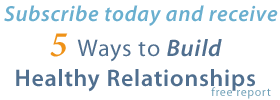Grief: How to respond to Good Pain
Greetings. Welcome to my post. My hope and desire is that you will find these posts to be informative and helpful for you. Life is a journey filled with mountains and valleys in our relational life and in our personal life. Sometimes we can predict and make something happen. But sometimes we can never predict an event or relationship difficulty and we need to adjust and cope with these curve balls. At times life can be great but as you know, life can also be difficult and challenging.
When we think of suffering, pain and grief, we also need to separate the difference between good and therapeutic suffering and pain and bad or destructive suffering and pain. The challenge and invitation is to know the difference between the two and to learn and discover the right type of healing to each one.
So when it comes to this topic of good pain, we always need to be reminded that becoming proactive is must more important than reactive. Good pain can lead to healing in our life when we focus on approaching this type of pain in a more real honest way. But when we avoid or hide or try to manage our good pain our way, then we start to think we can fix ourselves and our pain our way.
I was reminded of this recently in my role as a chaplain at a local hospital. A woman came into the hospital complaining of pain. She had physical pain for more than 4 months but kind of kept this to herself and did not share this. Occasionally she would tell her husband about this pain and he world encourage her to go and talk to her medical doctor about this problem but she dismissed him. She stated that all doctors want to do, is find a disease or something wrong with you so that they can make money off of you. In other words, to seek a doctor asking for help to get rid of her pain is a good thing to do. Good pain can lead to health and good pain can lead to solutions. This woman also feared that the physician may order a bunch of tests, tell her to go into the hospital so that the hospital can use her to bill and make more money.
The problem is this: She avoided and did not address her good pain and instead her good pain turned into bad pain. Her avoidance only led to her not being real and honest and instead her good pain did not get treated. Instead her initial good pain turned out tobe her worst nightmare: Cancer. Her good pan could have been treated right way via surgery and her cancer could have been out of her body. But instead her cancer took over and her good pain turned into bad pain as she went for 5 months of trying to fix her pain via various forms of treatment. In the end, none of this treatment worked. She did die at the young age of 52 due to her delay of treating her good pain.
Good pain is always the time to realize that one’s coping mechanism may not work anymore. Good pain leads to those moments in life in which you must surrender and confess that the pain you have in your life cannot be managed or coped doing it your way. Good pain does not have to lead to suffering or unnecessary bad suffering. Good pain does come from a place in which you do confess and ask for help, and come to your senses that how you are managing your pain is not working. It is insane to think that managing your pain your way and thinking that the outcome is going to be different is recognizing that this does not work. The saying is true: Doing the same over and over again expecting a different result is insane.
The sooner we can accept pain as the pathway to healing and growth, the sooner we will all be on the road to recovery. Seeking help with good pain and good healing may not feel good but the strategy does work. Saying goodbye to good pain and letting go and surrendering of your way to manage your pain your way is good. Find a way to resolve good pain quickly rather than letting pain linger will eventually not work and good strategies to manage good pain will work.
But if we avoid, than we all will have to face the bad pain and consequences of our pain affecting not just our lives but also affect others. As the husband said to me when his 52 year old wife died due to her avoidance, he wishes his wife would have sought treatment earlier and he now has to deal with her anger for her being selfish and only thinking about what she wanted to do, and now he is left with his pain given his wife did not consider how her pain would affect him. Seeking help for good pain does work. Avoiding treating good pain early will not only help you but also help others.
So my question to you is this: Where in your life can you seek good pain and not avoid this? Where are you becoming proactive rather than reactive?











